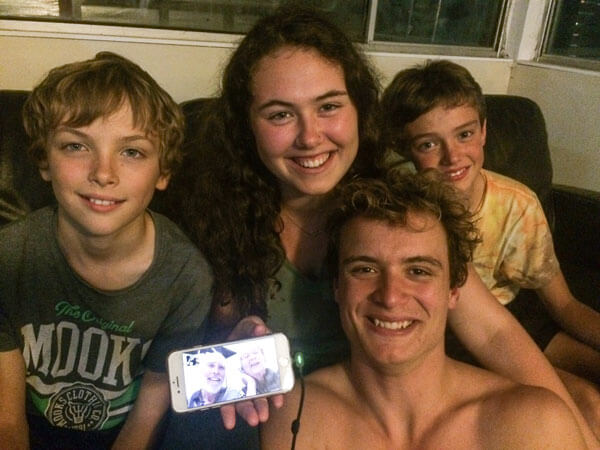Support yourself emotionally during Coronavirus Lockdowns
As natural therapists we’ve been bombarded by calls to our clinic. People are asking what they can do to boost up the immune system and help prevent disease. You can find this kind of thing all over the internet, so I’m going to focus on another, less obvious pandemic sweeping the world – panic.
This Coronavirus disease can get pretty horrible, so before I talk about anything else, I’m going to acknowledge rather than minimise people’s fear.
This is very real, and I understand there are many people totally freaking out. There has been widespread panic. At the same time, I also want to acknowledge that there is a lot we can do to support ourselves while that panic is spreading around the world. This can make a big difference to the quality of our lives and the strength of our immune systems. Not to mention the quality of our relationships with our loved ones. This is what I want to focus on right now, because we can do something about it right now.

These truly are exceptional times. I was at the supermarket earlier in the week and the meat section was completely empty. To be honest I almost burst into tears and found myself shallow breathing in a way that reminded me of being younger when I used to get panic attacks. At the time I used to stop for a moment and make myself breathe more deeply into my lower belly, which was super tense. It used to really help to fill it with air and allowed it to soften.
Because when we panic, we don’t breathe properly. We shallow breathe and this tells our body we are in danger, which then makes the reaction worse. It’s like a self-feeding and self-perpetuating mechanism. Breathing more deeply can help to gradually, gently disconnect ourselves from our fight/flight reaction centre and reconnect to the decision-making part of ourselves. So, rather than just thinking about this in theory, I breathed while I was standing there in front of those empty shelves. Filling my lower belly. Even though I didn’t want to. I didn’t want to allow myself to relax at first. I wanted to tell myself to panic. I wanted to cry and scream and have a big tantrum. Instead I told myself to breathe until I felt a little dizzy from hyperventilating, but I didn’t care – I’d rather feel slightly dizzy than panicked.
Breathing deeply into the lower belly helps during stressful times to anchor us into our bodies. This allows us to be more present for those challenging situations when we are in no immediate danger even though our body’s responses think we are. My breathing and self-talk didn’t make me feel any better about the prospect of having to eat meal after meal of tofu (which I bought three kilos of instead of mince – and by the way, it fries up beautifully with sesame oil, soy sauce, garlic and chilli flakes). I also managed to nab a random packet of duck breast stir fry strips (which actually sounds quite yummy and will encourage me to get more creative with my cooking). But it did help me deal with the urgency of my fears.
I also took some Aconite from my homeopathic first aid kit when I got home, because I felt a little jittery, which helped me feel better and I slept surprisingly well that night, feeling refreshed in the morning.
But something else happened at the supermarket which I’ve been thinking about ever since. It was a very low-key exchange, but a powerful one for me. As I was finishing up with my shopping and standing in front of the eggs, lost in my own jumble of thoughts and tension and fear, a woman spoke behind me and I literally jumped out of my skin. Now, if you’ve been to the supermarket lately you know it has the atmosphere of a war zone. Being quite sensitive to “vibes” or whatever you want to call it, I couldn’t wait to get the hell out of there and was only just holding it together. I was completely unaware anyone was even next to me.
“Thank goodness there are still eggs left,” the woman said to me with a tentative smile as I looked around.
That single sentence and smile made me feel almost like hugging her for pulling me out of my downwards spiral. I smiled back and said, “I know, this is so intense isn’t it?”
Then her smile grew, and her posture seemed to relax as mine had, and we shared a moment. It was a 1.5m away kind of moment, but in that moment, it changed everything about how I was feeling. I was no longer completely alone with my thoughts and my fears and my battle with my panic. There was someone else, who I didn’t know at all, who shared the way I felt. Even if that person didn’t completely feel those feelings in the same way I did, there was that moment of connection and understanding that made the situation less lonely and more bearable.
So, I would like to be brave and suggest that connection is one of the ways we deal with this widespread sense of panic. It doesn’t have to be face to face connection, or any closer than the required 1.5m away from someone else. It’s just reassuring to know that there are other humans in our local world who are about more than just competition for the last remaining toilet paper rolls or cans of tuna.
They are human beings with the same jumble of thoughts and fears and anxieties as ourselves, who might have heard some bad news that morning or are worried because one of their loved ones has the beginnings of a sniffle and scratchy, sore throat.
We’ve memorised the symptoms of Coronavirus
One of the things that makes us human is our ability to empathise and connect with each other. I believe this is a vital key to help each other through this – because this is a shared situation. Nobody feels entirely comfortable about Coronavirus, nobody can be certain they’re completely immune, no matter what they do. Really, the only thing we have left once the last space in the pantry is filled with food, and we’ve overdosed on vitamin C to the point where our guts are grumbling, and we’ve memorised the symptoms of Coronavirus down to the decimal point of the degree of fever, is to surrender. According to the Australian Department of Health the symptoms of Coronavirus include fever, coughing, sore throat, fatigue, and shortness of breath.
(And by the way that’s what happens when you have too much vitamin C, you get loose stools. It’s not really vitamin C side effects)
We as westerners don’t find the idea of surrender an easy one. And I’m not suggesting surrender in a way that you powerlessly succumb to disease, panic or any other condition. It’s not like that. It’s a sense of trust and relative calm, that you’ve taken all the actions you can take, and you’ve made the choice to let go a little. Or even if you haven’t done everything you possibly could do. You’ve been as reasonable in your preparations and preventions as possible to ensure the continued health, well-being and safety of yourself and your loved-ones.
Hunting for vitamin C. But what then?
Even if you don’t feel you’ve adequately prepared for this. Even if you can’t bear to face another set of empty shelves at the supermarket or go hunting for vitamin C. Take a moment, here and now if you can, to connect with yourself. Doing this won’t take more than a few minutes and you can do it anywhere and any time as long as you can give yourself a moment of solitude in your circumstances.
Depending on your stress levels, you may find a part of yourself resisting quite strongly to slowing down even for a couple of minutes. We are programmed from a very young age to believe that anything but being busy and productive is counterproductive. So, for many people it feels weird to stop. But we are now out of balance because we’ve spent so many years judging ourselves and each other if we’re not super busy. In fact, busy-ness has become somewhat of a status symbol and even as I’m writing this I’m smiling ironically because I also go around saying how busy I am.
I wonder if this is one of the things that might change as we move into a new way of being through these crises we’ve been experiencing? There is change happening, we’d be blind not to see it. We have a choice here. Either we can see this as nothing but terrifying and horrible. The symptoms of this can get terrifying and horrible, so we’d be justified in seeing it that way. But we can also see something more than that if we decide to look a little deeper.
Could there actually be a reason why this is happening? Are we as humanity being nudged into a situation of radical change? Let’s face it, the old ways haven’t been working so well for us. Change is scary because we don’t know what’s at the other end of it, but we as a society have been resisting deep change within ourselves for so long, hiding in our busy work days and the social whirl, or the endless stream of input on our phones. What if there are also good things that lie on the other side of change, even if we have to give ourselves space and let go of so much? Because giving ourselves space and time for change to manifest something new often means experiencing pain, facing the stuff we’ve been hiding from ourselves and dealing with the sometimes-hard truths.
So, while we self-isolate, do we then just hide at home alone and nurse our busy-hangovers during quarantine, crying into our hot beverages and take-away meals? Or numbing ourselves with hours of mindless television?
There is another way
It’s about connection, which can require courage because initiating connection with others can sometimes be a little intimidating.
Many people are talking about the ways they are making more of an effort to connect with each other during quarantines and Coronavirus Lockdowns. Might we consciously and purposefully invite this more into our lives even while we’re physically removed from each other? Even if it’s a text message to a friend asking if they’re okay, or a spontaneous phone call to a loved one to tell them you care. It might be a reassuring and appreciative smile we give the overwhelmed supermarket checkout operator or health care provider.
It might be the choice we make not to let our fear and anger dominate the situation when we disagree with someone, or a choice to be polite instead of hostile. If we make it a priority to foster connection and quality relationships with people we don’t know (or even those we do), we might fear that we’re missing out on something vital to our survival. But we live in a society of plenty which is just experiencing a few supply issues at the moment. We don’t have to compete with our fellow people to survive.
After all, connection is one of the basic requirements of human survival.
When we move out of competition, we begin to embrace community and a mentality of sharing. Then we truly have a state of plenty for all.
So, while I acknowledge that we live in sometimes scary times, it’s important to also remember that we are being given the opportunity to embrace fundamental change. Instead of fighting our fellow human, maybe we could try something different and give them a tentative smile instead.
Ways we can support ourselves through stressful and challenging times:
- The most effective technique I’ve found to help soothe my fear response is to breathe deeply into your lower belly, for at least 5 deep breaths, more if need be. If you are not in immediate danger and can safely spare the minute or so needed for this exercise, bring your attention towards your lower belly and away from the urgent messages from your flight/flight centre. Just make sure you don’t take this too far – stop if you feel dizzy otherwise you might fall over.
- We are not islands. Make sure you reach out if you’re feeling low. It might feel weird to some people, as though you’ve failed if you admit you’re struggling. But we all feel pain and a wide spectrum of other emotions. True strength is about opening and trusting those around you who deserve your trust.
- It’s likely the person standing near you (but maybe not too near!) at the bus stop, in the shopping queue or in the waiting room is feeling a similar way to you. It’s not going to kill anyone if you smile or nod or even acknowledge the strain of living in this crisis. Foster a sense of momentary connection with a stranger.
- Text or Skype a friend or loved one. Tell them you’re thinking of them.
- Gift someone tissues or toilet paper or a can of tuna if you have plenty. Or be there for someone else in a spontaneous way – it’s amazing how the gift of giving actually makes the giver feel super good too.
- Give yourself limits on how much you check on Coronavirus updates and read through symptom lists – and stick to them.
- If you’re stuck at home in self-isolation, make sure you dedicate some time to sit in the sun, or read an inspiring book. Practice self-nurturing activities, even if that for you is finding out where the pantry moths are coming from after six months of being too busy to think about it.
- There are many free online courses these days if you have lots of time on your hands to take your mind off it all.
- Walking – this is a great thing to do on your own if you struggle with too many thoughts because it brings the movement from the mind to the body and gives your mind a little space.
- For those with extreme anxieties they struggle to manage even doing all the above, there are many guided meditations online you can access.
- Here’s one that came to me today, and it’s one you can do anywhere whether your eyes are open or closed, whether you are at home on the couch, in public or lying in a hospital bed:
Rest your attention in the centre of your chest. This is where many people store a lot of tension, so if you feel tense or find it difficult to focus there, be gentle with yourself. As you gently and naturally breathe into this area, visualise that a small version of the sun is shining brilliantly from this space. Imagine that it is so bright, it is literally dazzling your imaginary eyes. The many rays of the sun are beaming out from all angles, the sides as well as front and back, to cover your entire chest area. Now imagine the light rays filled with strength and vitality, bathing your lungs with life-giving sustenance and allowing you to feel protected and bathed in healing energy. You can make the rays as big bright as you want.
You might think this is all very nice and fluffy, but there is a lot of science these days showing the many benefits of these kinds of visualisations, and I suggest that you do something like this at least a couple of times a day. Even if it’s only for a couple of minutes at a time, you’re going to be giving yourself the space to do something different to the usual, which will provide a quiet kind of support during Coronavirus Lockdowns.
Other ways to find support during the times of Coronavirus:
- Try Bach flower remedies which you can find from your local health food shop, especially Walnut which can give a person a sense of protection, Rescue Remedy for shock and panic, Mimulus for known fears and Elm for a sense of overwhelm. These can be mixed and taken whenever you feel you need it or put into a drink bottle to sip on every so often.
- If you don’t feel comfortable reaching out to a loved one, Lifeline and other organisations may be of assistance in just listening if you have a non critical situation you need a sounding board for.
- If you find yourself with some free time on your hands, there’s nothing like an awesome homeopathy documentary , or some virtual museum tours to feed your mind because what you take in through the media and television also influences the immune system. So keep it positive and inspiring if you want the best for your health.
And remember, you are not alone even if it feels like you’re the only person on the planet. We are all in this together.

So yes at our clinic, we have been received many calls and questions about:
- How to make sure you are boosting your immune system?
- Coronavirus symptoms?
- Can you have too much vitamin c? To answer that megadoses of vitamin C might cause diarrhea and nausea.
Yes reasonable questions and yes much panic. I hope this blog has helped give ideas about how can you stay sane and connected during the Coronavirus pandemic.
- The importance of Muscle Mass in menopause - 12/03/2025
- Penny’s gluten free bread recipe - 14/10/2024
- Children and bedwetting: What can parents do to help? - 01/10/2024





Leave a Reply